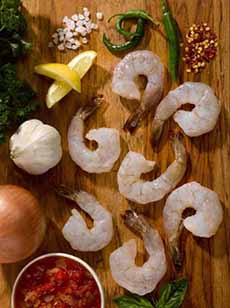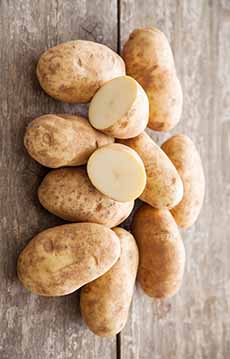Recipe Riff: A New England Seafood Bake In A Potato, With Shrimp
|
Every shrimp lover has a favorite shrimp dish. Beyond the iconic shrimp cocktail and shrimp scampi, a few of our favorites are beer-battered shrimp, coconut shrimp, grilled shrimp, shrimp ceviche and shrimp and grits. Truth to tell, we wouldn’t turn any shrimp dish away, from the simplest to the most complex, the mildest to the most spicy. For National Shrimp Day, May 10th, we tried something new: a shrimp baked potato (photo #1) that’s actually a riff on a New England seafood bake. A seafood bake—a baked version of a seafood boil—has a combination of different fish and shellfish, corn, potatoes and sausages. But to celebrate the day, we’re keeping it simple with just shrimp. You can serve the shrimp potato as a first course or a side. We had it for lunch, with a large green salad topped with more shrimp and deviled eggs. And for starters: a Bloody Mary cocktail with—you guessed it—a boiled shrimp garnish. Thanks to the Idaho Potato Commission and to Stephen Toevs, Director of Culinary Development at Marriott International Luxury Brands, who developed this delicious recipe. This recipe is for one serving (one potato). Scale it up accordingly. Ingredients For The Pickled Red Onions You may want to make a double batch of these. They’re delicious on just about anything. 1. MAKE the pickled onions. You need to do this at least a day in advance, but can do it several days in advance. Combine the vinegar, water, sugar and salt in a saucepan, and bring to a boil. Remove from the heat. Place the onion slices in a container and pour the pickling liquid over then. Let cool, then refrigerate overnight. 2. CLEAN the potato under cold running water and pat dry. Cover it with 1 teaspoon avocado oil, and sprinkle it with salt and pepper. Smoke the potato over hickory wood chips for 15 minutes (we used a smoker bag), then wrap in aluminum foil and finish on the grill at 400°F until tender, about 1 hour. Set aside and keep warm. Here’s more about cooking potatoes on a grill. 3. TOSS the shrimp in a large bowl with the remaining 1 teaspoon of avocado oil and the Old Bay seasoning. Place the shrimp on the 400°F grill along with the link of linguiça, the ear of corn, the shrimp and the lemon half. Grill the shrimp for 4 minutes, grill the corn for 8 minutes and grill the linguiça for 10 minutes, turning as necessary. Grill the lemon half, cut side down, until charred. 4. CUT the sausage into slices and cut the corn off the cob. In a small bowl, mix the chopped parsley with Greek yogurt. 5. ASSEMBLE: Split the potato open lengthwise and hollow out a trench. Spread the parsley-yogurt mixture on the inside. Fill the trench with the shrimp, corn and linguiça. Garnish with the pickled red onion and fresh herbs. Serve with the grilled lemon half. NOTE RE CHARRED LEMONS: The heat from grilling the lemons releases more juice, and gives the juice more depth and complexity. The acidity is brighter and less sour. You can use the juice, which has a bit of char flavor, in other recipes: in vinaigrettes and cocktails, over vegetables and seafood, etc. *You can cut down on expenses by using frozen shrimp, but you’ll lose the glamour of the tail. †Old Bay Seasoning Recipe: If you don’t have Old Bay Seasoning make this copycat recipe: Combine and grind the following spices in a spice grinder or with a mortar and pestle: 1 tablespoon celery salt, 3 whole bay leaves, 3/4 teaspoon brown mustard seeds, 1/2 teaspoon black peppercorns, 10 allspice berries, 10 whole cloves and 1/2 teaspoon paprika. Now owned by McCormick, Old Bay Seasoning was introduced to Baltimore in 1939 by an emigrant from Nazi Germany, Gustav Brunn, a spice dealer. Ironically, he was fired from McCormick after two days, upon discovery that he was Jewish. He started the Baltimore Spice Company, and combined 18 herbs and spices into what he called Delightful Brand Shrimp and Crab Seasoning. He renamed the product after the Old Bay Line, a passenger ship line that sailed Chesapeake Bay; and marketed the usage beyond shrimp and crab, “For Seafood, Poultry, Salads, Meats.” Here’s more of the story. ‡Linguiça (Lin-GWEE-suh) is a pork sausage heavily spiced with chiles, garlic, paprika; and often, cinnamon, cumin and oregano. There are many variations, but classic linguiça is a coarse, country sausage, often smoked. The Portuguese community of Gloucester, Massachusetts introduced the style to the greater New England area. Rich and spicy, it is also delicious on pasta, pizza, salads, sandwiches and soups. |
|
|
|
|
||







